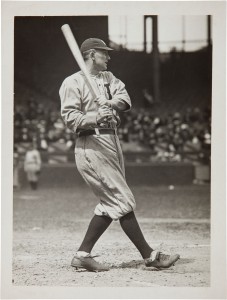So, you went to hear The Great Preacher. He made you laugh. He made you cry. He left you with new insights about the Bible and your life.
I’m not surprised. He is gifted, with well-honed skills.
He left you feeling inadequate as a preacher.
I’m not surprised about that either — though I want you to know it is an illusion. You have every good and true reason to feel hope about your preaching. You love Christ. You are a student of the Bible. You love the people in your congregation. You will have opportunity to practice.
The problem is that going to hear The Great Preacher has skewed your sense of what you should be striving for.
If you will excuse a baseball metaphor, what you heard at that service was a home run sermon, and probably with bases loaded.
The Story Behind the Great Preacher
You need to take a step back and look at the situation. The Great Preacher had every reason to hit a home run.
- He has years of experience as a pastor.
- He earned a PhD in homiletics.
- For many years he has been teaching preaching as a professor at a theological seminary.
- He has written books on the topic.
He’d better be a good preacher.
The secret back story, though, is that you are not the first to hear that sermon. He takes that puppy on the road. Every witty turn of phrase, every story of human struggle, every bit of biblical exegesis, has been tried out on any number of congregations.
He has had the opportunity that most preachers never get: to gather feedback on his morning’s work, revise, and try it again.
Yes, pastors who lead very large churches, have something like this opportunity on a weekly basis.
One I have always loved is Earl Palmer, whom I first knew at First Presbyterian Church of Berkeley, and then later at the University Presbyterian Church in Seattle. In a church that had multiple services Earl could gather input after the first go round, and work it in to an improved version later in the morning.
And, in a large church with multiple pastors, the preaching pastor can probably spend a disproportionate amount of the week in sermon preparation. With more time to study and write, and more opportunities to preach the sermon, there is the possibility to improve one’s skills.
Contrast the small church pastor, the Jack or Jill of all trades, who must meet with every committee, and visit each sick member, as well as representing the church in community events. That pastor tries to squeeze out a half-hour here and a half hour there to prepare a sermon which will be preached only once.
It’s a longer journey to get Malcolm Gladwell’s 10,000 hours on the road to being an expert.
So my first point, since you have only recently taken your first preaching class, and even more recently preached your first Sunday sermon, is to avoid comparisons. To paraphrase the tenth commandment,
Thou shalt not covet thy neighbor’s preaching ability.
Comparison is the root to envy (one of the seven deadly sins, by the way), and misery.
Can You Hit a Home Run Sermon?
Frankly you should not even be striving to hit a home run.
When they set kids up to learn the beginnings of baseball they put the ball on a T and just hope, sometimes vainly, that the kid can touch it with the bat.

And take heart: even the very best baseball players strike out more than they hit the ball. The great Ty Cobb had a lifetime batting average of .366.
So for now, your goal should be to take courage, step up to the plate once again, and take your swing.
Blessings,
Gary
————
If you enjoyed the post I hope you’ll share it!


I really appreciated your feedback on preaching a few entries ago — and I appreciate this entry as well. It is tempting to try too hard at sermons and at everything else.
I once watched a very good conductor walk a treadmill at the gym. It occurred to me as I watched him that he approached exercise in the same way that he approached music: with a firm sense of who he was, the ways in which he needed to be challenged as well as his natural limits. He avoided both selling himself short and striving for a genius that was not his to have. There is some lesson here, perhaps, for spiritual life, including the life of preaching.
Thanks Gary — I hope you saw my reply to your comments on last week’s post. Sadly the website has no way to notify you when people reply to comments.
Your story of the conductor reminds me of some of the early Taoist parables of Chuang Tzu., especially one about a butcher who never had to sharpen his cleaver as he followed the nature of the animal he was cutting up. He said he simply placed the sharp cleaver in the empty space in the joints between the bones. A less skilled butcher hacks, wearing out a cleaver in a year.nif this kind of lit is of interest, check out this title: https://www.amazon.com/Wandering-Way-Chuang-Tzu/dp/082482038X/ref=sr_1_1?s=books&ie=UTF8&qid=1493858246&sr=1-1&keywords=Taoist+parables
Thanks, Gary, for the words of wisdom. I have learned much from the publications of a famous UM pastor, including reading his book about his method. I felt pretty bad about myself until I realized that about 80% of his job in his very large, well-staffed church, is simply crafting a really good sermon. There’s no way the average pastor, like me, can do that. I have to find my satisfaction in doing my best as part of many multiple tasks weekly.
Thanks Megan! Great to hear from you.
If this blog post gave perspective and comfort as you (an excellent pastor) found yourself comparing unfavorably with a prominent pastor, then I’ll consider it… a home run!
Gary:
I have two comments about this post. 1) While we might not be home run hitters, every now and then the Holy Spirit will use us to hit one out. 2) I have had the priviledge of meeting a couple of “Home Run Hitters”. One of them I think would be good at pastoral care portion of many of our calls. The other one would have a tough time doing pastoral care for a member of the congregation.
Thanks Steven!
Yes, it can run both ways, as with less prominent pastors. Some are gifted in many areas. Others excel in one and fall flat in another.
And I suspect that the Holy Spirit makes good of your preaching far more often — even if you don’t feel like it was a “homer,” any given sermon may be crucial for some particular listener, whether they tell you or not.
Glad to see you here on the blog.